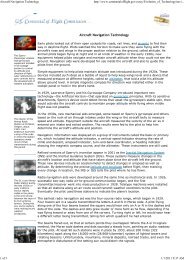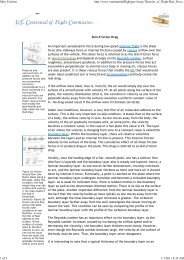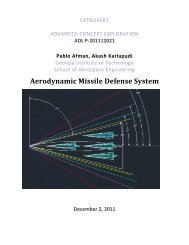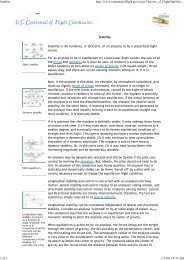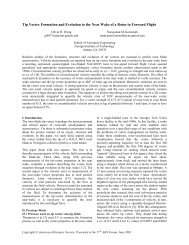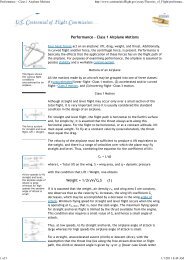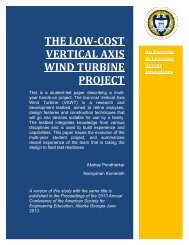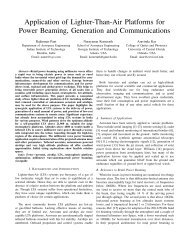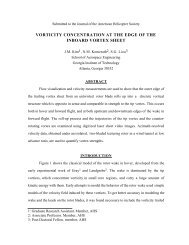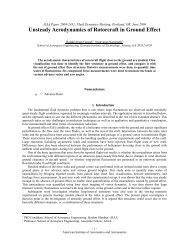Boeing-University Relations - A Review and Prospects for the Future
Boeing-University Relations - A Review and Prospects for the Future
Boeing-University Relations - A Review and Prospects for the Future
You also want an ePaper? Increase the reach of your titles
YUMPU automatically turns print PDFs into web optimized ePapers that Google loves.
“Where possible, we place students in industry co-op arrangements <strong>for</strong> <strong>the</strong>ir final year <strong>the</strong>sis projects.”“More aware of <strong>the</strong> importance of cost in engineering decisions, <strong>and</strong> also <strong>the</strong> paramount importance of ethics.”“WFSF provides a very nice <strong>and</strong> a very broad overview of a modern engineering company <strong>and</strong> how different typesof personalities with engineering backgrounds <strong>and</strong> training fit into it.”“While preserving <strong>the</strong> need <strong>for</strong> analytically rigorous teaching, teach students <strong>the</strong> topics that <strong>the</strong>y can benefit <strong>the</strong>most from applying in <strong>the</strong> industry upon graduation.”“Rein<strong>for</strong>ced in me <strong>the</strong> need to nurture <strong>the</strong> ability to self-educate among <strong>the</strong> students. I believe that ironically, this isan area in which large research universities accidentally succeed better than smaller programs.”“Far more accepting of imparting training on ‘soft issues’ such as leadership, value of collaborative partnerships,sensitivity to o<strong>the</strong>rs when working in teams, etc. which were not part of my vernacular be<strong>for</strong>e this experience.”“A profound shift occurred. I became much more committed to undergraduate education.”“I don't believe I would have read, thought about, talked about <strong>and</strong> written about education as I have done since.”“Became more aware of <strong>the</strong> many types of expertise an engineer needs - history, economics <strong>and</strong> politics.”“We must pay more attention to <strong>the</strong> fundamentals in <strong>the</strong> first 3 years <strong>and</strong> use <strong>the</strong> final year to transition <strong>the</strong> studentfrom <strong>the</strong> classroom to industry. The industry <strong>the</strong>n takes on <strong>the</strong> task of training <strong>the</strong> graduate.”4. What do you see as <strong>the</strong> top 3 issues <strong>for</strong> <strong>the</strong> future of engineering education today?“Balancing soft skills vs. basics; continuous improvement; student pipeline management vs. varying dem<strong>and</strong>.”“Ethics <strong>and</strong> assumption of personal responsibility.”“Establish a path to a master’s level professional degree; make ABET underst<strong>and</strong> that <strong>the</strong> concept of processimprovement applies also to <strong>the</strong>m; expose liberal arts students to engineering, <strong>and</strong> engineering thinking.”“Relevance of (bachelor’s) degree to industry needs; more uni<strong>for</strong>m improvement in communication skills; push tocreate <strong>the</strong> environment <strong>and</strong> get more acceptance <strong>and</strong> better utilization of undergrads in research programs.”“Curriculum/program management as "technology" continues to exp<strong>and</strong>; attracting more women <strong>and</strong> minorities toengineering; managing <strong>the</strong> balance between "good" teaching <strong>and</strong> research dem<strong>and</strong>s during declining state support.”“Masters as first professional degree; enrollment; curriculum revolution.”“Enough resources to continually adapt <strong>the</strong> curriculum to changing technology.”“A solid training in basic science, <strong>the</strong> importance of honesty <strong>and</strong> tolerance, <strong>and</strong> <strong>the</strong> practical environment.”“Making technological progress synonymous with social progress, world-wide. Interdisciplinary collaboration.”“Fitting exp<strong>and</strong>ing knowledge into shorter curriculum. Finding <strong>the</strong> resources <strong>for</strong> h<strong>and</strong>s-on experience. Attracting toptalent to engineering schools in competition with law, business, <strong>and</strong> medicine.”“Teach how to think <strong>and</strong> solve new <strong>and</strong> different problems <strong>the</strong>y may encounter.”“Teach to where we will be in technology in 2-5 years. Industry-relevant topics. Effective communication.”“How to evolve to fit <strong>the</strong> needs of a rapidly changing workspace while maintaining <strong>the</strong> strong emphasis onengineering science fundamentals. How to prepare a subset of our engineering population to becomeglobal engineering. How are we going to address <strong>the</strong> next evolution of industry.”“Industrial competitiveness. Revamp <strong>the</strong> accreditation process – note declining PE fundamentals exam scores underpresent ABET criteria. Meaningful dialogue on <strong>the</strong> proper content of engineering education.”“Ensuring strong K-12 education that supports a pipeline of students with interest in <strong>the</strong> STEM curricula.”“Recognize <strong>the</strong> importance of teaching <strong>and</strong> learning styles. Holding <strong>the</strong> interest of <strong>the</strong> brightest students. Seriouschallenge that we face to our decades-long position of leadership in science <strong>and</strong> technology.”“Training engineers who can *innovate*, as opposed to rote analysis. Ability to devote <strong>the</strong> proper attention toundergraduate education. Making engineering a welcoming discipline to underrepresented groups, such as women.”“Engineering education <strong>for</strong> sustainable development. Shift <strong>the</strong> paradigm towards addressing <strong>the</strong> common good <strong>for</strong><strong>the</strong> global community, away from regional considerations.”“Reward system at universities is in direct opposition to industry needs– <strong>and</strong> has propagated to most institutions.”“Lack of resources; high cost of education that is preventing some good students from getting education; <strong>the</strong>continuous struggle with increasing <strong>the</strong> diversity of <strong>the</strong> student body.”“Introduce business sense. Develop cooperation skills. Holistic approach towards corporate engineering work.”“Making room <strong>for</strong> fast-changing technology. Develop interdisciplinary programs while keeping accreditation.”“We have almost lost analytic thinking. Basic ma<strong>the</strong>matics skills are about to become extinct. Since ma<strong>the</strong>matics is<strong>the</strong> language of science, we are fast losing our ability to teach science.”


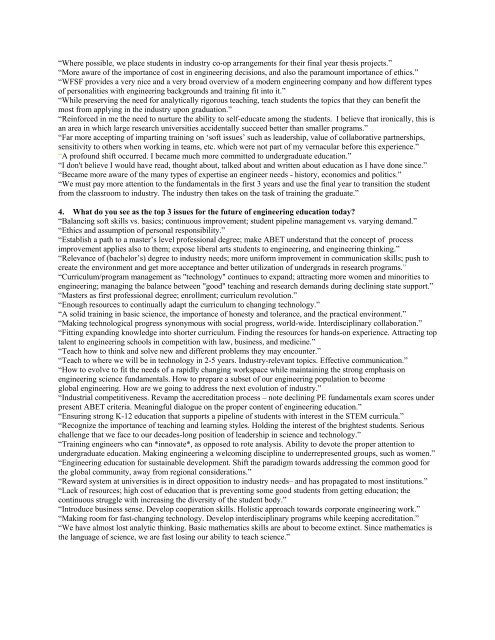
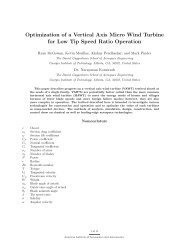
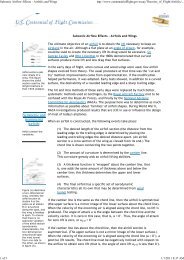
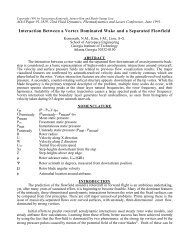
![p density of fluid, kg/m3 [Greek letter rho] V mean velocity of fluid, m ...](https://img.yumpu.com/50595898/1/184x260/p-density-of-fluid-kg-m3-greek-letter-rho-v-mean-velocity-of-fluid-m-.jpg?quality=85)
